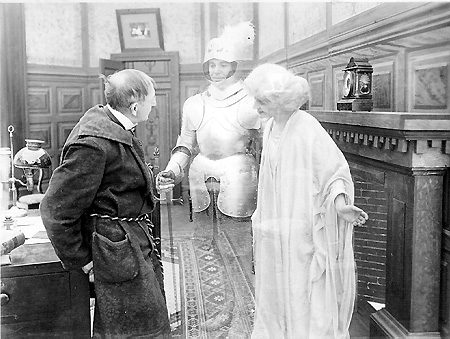 Volume II: Filmography
Volume II: Filmography Volume II: Filmography
Volume II: Filmography

James Cruze and Marguerite Snow had the title roles in WHEN GHOST MEETS GHOST, Riley Chamberlin played the owner of the haunted house.
Image courtesy Ralph Graham, M.D. (R-8)
April 6, 1913 (Sunday)
Length: 1 reel
Character: Comedy
Cast: Marguerite Snow (lady ghost), James Cruze (ghost in armor), Riley Chamberlin (the professor)
Notes: 1. The title was given erroneously as A Ghost Meets a Ghost in a review in The Moving Picture World, April 19, 1913. 2. The film was designated as a drama in The Moving Picture World's weekly schedule of releases. 3. Beginning with this film, Thanhouser's new policy of listing the several most important players in each film was discontinued. Later in the year, the practice was resumed.
ARTICLE, The Moving Picture World, April 12, 1913:
Marguerite Snow and James Cruze have played every known kind of part in the Thanhouser films except that of - ghost! So it should be with some degree of curiosity when you look for them in the release of Sunday, April 6, When Ghost Meets Ghost, wherein the two Thanhouser favorites are the very specters in mention. But it is a specter story that won't scare the youngsters in your audience, for it is a purely comedy plot that is worked up without any 'horrors' or 'terrors.' You see, it is an old comedy bachelor who lives in the funniest old haunted house. The wraiths are a lady ghost and a ghost in armor, and they are around too much to suit the funny old bach. He plans to rid himself of the ghosts by having them meet, for he suspects they might fall in love and elope. Sure enough, he does pull off a meeting, and sure enough they do fall in love and run off. The bachelor, clear of ghosts, settles back in his broad armchair and smiles, but he figured without his specters. They just loved the old home so they couldn't stay away. Arm and arm, each gazing lovingly into the others eyes, they returned.
SYNOPSIS, The Moving Picture World, April 12, 1913:
If you are a studious man, accustomed to burning the midnight oil, wouldn't it annoy you if each night at twelve precisely the ghost of the melancholy maiden appeared, weeping and lamenting? A certain professor was bothered this way. He was not afraid of ghosts and could have endured one whose specialty was silent haunting. He found, however, that the weeping maiden was a nuisance, and prevented him from concentrating. So he decided, ungallant though his conduct might be deemed, to get rid of her. Being a learned man, the professor knew that King Solomon used to cork wicked spirits in bottles and throw them into the sea. The professor's ghost, however, was an uneasy shade. He threw it into the sea, he buried it into the ground, but each midnight it would reappear and made the welkin ring with weeping and lamentation. Harsh measures having failed, the professor decided to see if love could subdue a tearful ghost. In a house near the professor's was the spirit of 'the youthful knight.' Nobody knew why he returned to earth, and he was not popular. Clad in full armor he clanked about the house, scowling fiercely. He was a regular killjoy, and tenants moved promptly after seeing him. Just the same the valiant professor decided to call upon the youthful knight. He carried the white lady with him - in a whiskey bottle - which, by the way, is an appropriate place for a spirit. When the youthful knight appeared, the professor set the other ghost free and was charmed to see that they were mutually attracted. Were his troubles over? Far from it. Unfortunately the ghosts were grateful, and decided, as a mark of their appreciation, to make their home with the professor. Then he moved in light marching order, and hastily, for being a learned professor he feared that his residence might become the headquarters for union ghosts.
REVIEW, The Moving Picture World, April 19, 1913:
An interesting bit of film work, in which the ghost goes in and out of a bottle, like the genie in the Arabian Knight's tales. But it is little more than an interesting novelty and not to be depended upon as a strong feature.
# # #
Copyright © 1995 Q. David Bowers. All Rights Reserved.